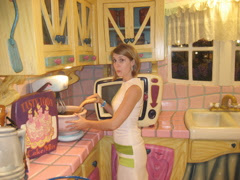So, a couple days ago my mom and I were talking about the environment, and my mom mentioned that she had read somewhere that compact fluorescent bulbs can't be thrown away with regular trash because they contain mercury. I don't know whether that's common knowledge or not, but I had never heard that before. I was also kind of surprised because CFL bulbs are usually touted as a major step towards being truly green, and "change your light bulbs" is always in at least the top five of all those "Ten Things You Can do to Save the Environment" lists. If people are just dumping their used CFL bulbs in the trash, and the bulbs contain mercury, then they really aren't being so green at all.
Anyway, I bring this up because today I did some research. Both General Electric Lighting and Tree Hugger confirmed that yes, CFL bulbs do contain mercury and should not be thrown out with regular garbage. There are a variety of recycling programs that are popping up throughout North America, and both sites referred to Lamp Recycle as a good source to find out where you can take your used bulbs. I didn't find that site particularly helpful (there were only four Canadian locations listed) but I was interested to discover that Ikea takes back used CFL bulbs.
GE Lighting says that each bulb only contains a tiny amount of mercury, and no mercury is released while they are in use and if they are disposed of properly. Both GE and Tree Hugger say that while the whole mercury thing isn't ideal, it's still better to use CFL bulbs over incandescent bulbs because the CFLs are just so much more efficient. They also both note that most of the mercury polluting the air and water comes from giant coal plants that are generating electricity. Therefore, the less electricity you use, the less mercury that gets spewed into the environment. And as long as you dispose your CFL bulbs properly, mercury pollution shouldn't be too much of a concern on that front.
So there you go. I found enough information to convince myself that compact fluorescents are probably still the best option, short of living without lights altogether (it's 4:30 p.m. right now and it's already dark here...living without lights doesn't feel very appealing). It does go to show, however, that more information is needed than simply telling people "Switch your bulbs." When you're doing things to solve a problem, you need to make sure you're not just making another problem (that's my whole beef with ethanol, but that's a different topic for a different time). Anyway, if anyone knows anything else about good lighting options, let me know...
Wednesday, November 28, 2007
a bright idea
Subscribe to:
Post Comments (Atom)

No comments:
Post a Comment